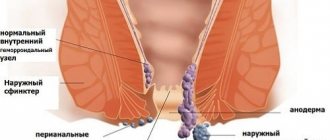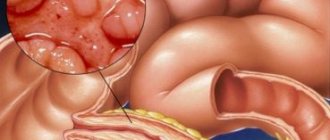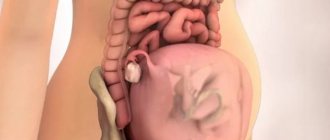Stomach pain during pregnancy: normal or pathological
From 1 to 12 weeks of pregnancy, a number of serious changes occur in the mother’s body.
Typically, pain in the abdomen appears due to physiological factors that do not pose a danger to the woman and the fetus.
Typical causes of abdominal pain in a pregnant woman, considered normal:
- Unstable functioning of the stomach and intestines. In this case, in the early stages of the perinatal period, digestive dysfunction occurs - difficulty or absence of bowel movements, flatulence and bloating.
- The hormones produced during pregnancy are progesterone. This component softens joints and ligaments, promotes the slow formation of the birth canal and prepares the female body for the birth process. The uterine ligaments become more elastic and stretch, which causes characteristic pain.
- Growth and elevation of the uterus in the peritoneum. By the end of the 1st trimester - at 10-12 weeks, the uterus changes its size and rises from the pelvis to the abdominal region. At this time, abdominal pain can be caused by stretching of the muscle tissue of the organ and its enlargement.
These changes are not considered dangerous, their duration is short, but doctors advise reporting them to a gynecologist.
Only a certain type of pain can signal that there are no threats to the course of pregnancy. If the pain is not sharp or acute, but aching in nature, this may indicate the implantation of the embryo into the uterine wall and the attachment of the fertilized egg. This condition may be accompanied by pinkish discharge and implantation bleeding.
How to overcome stomach problems in the first weeks of pregnancy
Disturbances in the digestion process of food in the early stages of pregnancy are caused by the manifestation of toxicosis. It goes away after the formation of the placenta is completed and does not harm the health of the mother and fetus. Morning nausea leading to vomiting, cramping pain in the stomach - these painful phenomena can be eliminated or alleviated by available means.
- After waking up in the morning, nausea and pain in the stomach are felt especially strongly. If it is difficult for a woman to eat in the morning, you can drink a glass of warm water, which will induce vomiting and make a normal breakfast possible. Water will reduce the concentration of substances that are perceived by the body as toxic. The effect can last throughout the day if you follow the correct diet.
Long intervals between main meals should be divided into several short periods. During the breaks between breakfast, lunch and dinner, you need to eat a product that does not cause nausea 1-2 times and drink some liquid. An empty stomach reacts much more strongly to irritants.
- Hunger attacks are not uncommon for pregnant women. Eating food too quickly can cause indigestion with further intestinal spasms. This can be avoided if you do not take large sips when drinking, eat with small spoons, chewing dense pieces well.
The nature of the physiological manifestations of stomach pain during pregnancy
Pain in the stomach should not be confused with pain in the intestines or other organs of the peritoneum. It can have a different character and strength, it all depends on the reason. The intensity of the discomfort depends on the woman’s pain threshold. Usually they are aching, sharp, cramping, but short-lived.
Heaviness after eating in the early stages
In the 1st trimester, after eating, painful cramps in the lower abdomen are possible. They arise as a result of physiological processes when a full intestine puts pressure on the growing uterus. Discomfort occurs approximately 15-30 minutes after a meal. This condition does not require treatment.
Pain after medicine
Sometimes discomfort in the stomach occurs after taking any medicine. The condition is often characterized by nausea, vomiting, or upset bowel movements. The body begins to reject the drug due to changes in it. As a way out, it is recommended to stop the medication and cleanse the stomach, drink sorbents such as activated carbon or Polysorb.
Bloating and nausea
The stomach swells and nausea occurs, usually due to poisoning. This phenomenon can be stopped with sorbent drugs, and sometimes approved antispasmodics are used. To eliminate nausea, antiemetic medications are used.
Prevention
To prevent the occurrence of pain in the stomach, women should take preventive measures:
- After eating, you should not take a horizontal position. It is better to walk a little, sit or do simple exercises.
- Expectant mothers should not convey, they should eat at least 5 times a day in small portions.
- The diet should contain only healthy foods.
- You should drink at least 1.5 liters of clean water every day.
- It is extremely important to protect yourself from stress during this period.
- You need to take walks in the fresh air regularly.
- Prolonged fasting is prohibited.
- According to the recommendations of gynecologists, you should regularly take vitamin and mineral complexes.
- It is important to normalize sleep.
The nature of pathological pain sensations
Pathological conditions are accompanied by pain, the intensity of which depends on the underlying cause.
- In the case of gastritis, complicated pancreatitis or colitis, there is a sharp and severe pain that lasts a long time. The character is cramping, sharp, like an ulcer. The patient may even feel a dagger-like pain.
- Physical overload or psychological stress. These factors cause severe pain. The discomfort goes away on its own after 1-2 days.
- With food poisoning, a woman, in addition to pain, suffers from nausea, vomiting, diarrhea, and weakness in the body. The nature of painful spasms is aching or acute, depending on the severity of poisoning by toxins - waste products of pathogenic agents.
It is necessary to consult a doctor, since there is a risk of worsening the mother’s condition due to the progression of the disease.
Acute and sharp pain in the left side in the later stages
In the 2nd trimester, the fetus grows rapidly. The baby becomes cramped in the uterus, he moves with low intensity, but the force of the turns increases, and sometimes significantly. For the mother, these movements can be painful, especially if the bladder is full. Such discomfort is not dangerous and is considered a natural process.
If noticeable pain occurs, you can change position. You should also relax, take a couple of deep breaths, stroke your belly and talk to the baby - ask him to calm down.
Severe stomach pain with cramps
The uterus is held between the iliac bones by connective ligaments.
During pregnancy, her weight increases and the ligaments become more strained. Due to this, women feel pain. Discomfort is usually localized in the lower part of the stomach, inguinal folds and the area above the pubis.
Severe painful spasms can also occur due to a sudden change in body position:
- during fast turns;
- when getting up;
- when lifting weights;
- during coughing and sneezing.
The mother feels a sharp pain, which quickly passes without taking therapeutic measures. Painful sensations of this origin occur at any stage of pregnancy and may disappear towards the end.
Cramps after eating
During gestation, specific hormones are produced that affect the intestines. Food is digested more slowly, and individual parts may become stretched, causing constipation. A woman experiences dull, bursting pain in the lower abdomen, usually in the left side. There is also increased formation of gases. As food is digested, the pain disappears, but may reappear if you eat the wrong foods.
A pregnant woman should drink plenty of fluids, eat fermented milk products, raw vegetables, fruits and bran bread. To prevent constipation, moderate physical activity is recommended.
What to do if your stomach hurts during pregnancy
Acute stomach pain during pregnancy should not be ignored, as it may indicate serious illness (for example, pancreatitis or ulcers). In this case, the woman urgently needs to contact a gastroenterologist, who will conduct an examination, based on the results of which further treatment tactics will be developed.
There are special medications for pregnant women that relieve pain caused by increased stomach acidity, as well as eliminate signs of heartburn. These include:
If it is necessary to relieve pain, pregnant women are recommended to use the following antispasmodics:
It is better not to use such a well-known and seemingly safe remedy as Spazmalgon for stomach pain, as it has side effects that can affect the child. But to improve intestinal motility and eliminate nausea, Cerucal is suitable.
Treatment of pain during pregnancy
Therapy is complicated by limitations in the ability to prescribe medications.
Prescribe any drugs with caution, taking into account the duration of pregnancy. The main task is to eliminate the cause. If the pain is severe, the use of medications is allowed. For mild discomfort, it is advisable to treat it with diet therapy, therapeutic exercises, increased drinking and massages. What pharmaceutical products can be used for abdominal pain in pregnant women?
- In the 1st trimester, taking pharmaceutical drugs is most dangerous. Severe pain is relieved with No-shpa, tincture of valerian and motherwort. You can also use Rennie, Gaviscon, Trimedat. Severe spasms are eliminated with the help of Papaverine hydrochloride or Cerucal.
- In phase 2 there are already fewer restrictions. Physical therapy, walks in the fresh air, drinking mineral water like Essentuka and a special diet are widely recommended. If a woman suffers from constipation, glycerin rectal suppositories can be used.
- In the 3rd trimester, it is advisable to use unconventional methods. Among pharmaceutical products you can use Smecta, Motilium and Essentiale. Their folk recipes highlight a tincture of birch buds.
Among the products recommended are dried apricots and prunes. These fruits will not only boost your immunity, but also improve your digestive function.
Which doctor should I contact?
If you have abdominal pain, you should make an appointment with a gynecologist or gastroenterologist. If we are talking about a severe attack, they call an ambulance and the therapist refers to more specialized specialists.
Is it possible to treat at home?
You can fight stomach pain at home, but only after consulting a doctor. The following means are widely used.
- Fresh potato juice.
- Flaxseed tincture.
- Tea with lemon balm and mint.
If pain is accompanied by nausea, apples and bananas help. In case of inflammatory reactions, drink milk with honey.
Is it possible to take pills to improve digestion?
A lack of enzymes can manifest itself as a violation of digestive function, causing bloating and heaviness in the abdomen. Doctors allow the following enzyme medications to be taken:
- Festal;
- Pepsin;
- Mezim;
- Pancreatin.
It is better to wash down these remedies with mineral water, for example Narzan. Then the enzymes will work fully.
Traditional methods of treatment for stomach pain
Traditional methods are not always justified and safe. This should be taken into account when choosing alternative medicine.
However, among them there are also quite reasonable ways to treat stomach pain:
- In the morning, 30 minutes before breakfast, drink 150 ml of potato juice. Continue until the symptom disappears.
- During the week, drink two egg whites in the morning and evening.
- 100 g of blueberries eliminate pain and normalize digestion.
- Dill water recipe for babies.
- Every day before bed, drink a glass of kefir with a spoonful of vegetable oil dissolved in it.
All these methods do not harm the child, however, with serious diagnoses, they will not save the woman from the primary source of pain - pathology.
Conditions that threaten the life of mother and child
Situations when you should call an ambulance are highlighted. These include:
- ectopic pregnancy - characterized by severe pain radiating to the leg and anus;
- premature placental abruption – accompanied by bleeding and cramping pain, severe and prolonged;
- premature birth - starting from 22-37 weeks, is caused by discomfort in the lower back and lower abdomen of a cramping type.
Stomach pain requires seeing a doctor in any case. A woman cannot always independently determine the degree of danger of a phenomenon. Sometimes discomfort is a signal of a serious illness that worsens during pregnancy.
A little about the cause of pain
Stomach problems in pregnant women occur at any stage of pregnancy and can be caused by:
- physiological changes in the body;
- diseases of the digestive system.
Physiological changes
Throughout the entire period of gestation, changes occurring in the body can provoke stomach pain and digestive disorders.
The reason may be:
- early toxicosis caused by hormonal changes;
- violation of the diet, when a woman indulges her whims and eats a lot of spicy or salty foods;
- overeating or long breaks between meals;
- displacement of the organ by the growing uterus in the later stages.
Stomach diseases
A pregnant woman’s body is more vulnerable, and during pregnancy the following diseases become aggravated or may develop:
- gastritis;
- duodenitis;
- peptic ulcer;
- esophagitis.
Fortunately, stomach pain in a pregnant woman is dangerous for the child only if it prevents the woman from eating properly and providing the child with the substances necessary for growth and development.
In all other cases, only the expectant mother experiences discomfort, but this is also dangerous, because pain makes the woman aggressive and irritable, which negatively affects the course of pregnancy.











